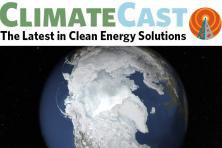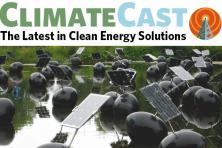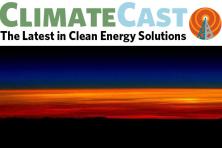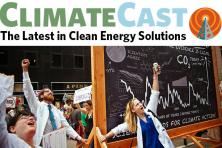Hard-won climate momentum
Here's something to give thanks for this coming turkey (or tofurky!) day: the incoming class of the House of Representatives brings Congress new possibilities to consider serious responses to climate change—or at least to get the work started. House leadership plan to resurrect a special climate change committee, providing a dedicated platform to amplify climate concerns. Some new members of the 116th Congress named accelerating the US transition to a clean energy economy among their top campaign priorities. The House’s new complexion has already brought new calls for a “Green New Deal” (for more on the subject, click here.) Writing in Vox, David Roberts takes a close look at the incoming Congress, and what renewed calls for strong climate action might realistically achieve in the continuing absence of a climate majority in the Senate.
Back to reasons for gratitude: The elections have opened the door for action on clean energy in multiple states and cities across the country. From enacting rigorous clean energy, energy efficiency, and carbon-reduction standards, to strengthening state-level opposition to Trump’s plans to weaken existing clean air and clean water laws, many states are poised after this election to fight back—and to move climate progress forward.
Clean energy pulls ahead
Adding to the mounting evidence that coal’s days in the sun are basically over, a new analysis shows that in many areas, building and operating clean energy is cheaper than keeping coal-fired plants running; over the next twenty years, the world’s energy systems will undergo a huge transformation to embrace clean energy. But that change may not be enough to curb the most catastrophic effects of climate change unless governments enact policies to reduce carbon. It will help that batteries are booming; $1.2 trillion in investment is expected by 2040. Cheaper batteries will help renewables stretch further, and can help spur new technologies to help fight climate change. In regional clean energy news, the Energy Trust of Oregon is offering up to a dozen grants to create programs that would make solar power more accessible to low and moderate income Oregonians within PGE and Pacific Power territories.
Where climate won (and lost) in the Pacific Northwest
In Washington State, big oil’s massive campaign spending succeeded in defeating Initiative 1631. Initiative 1631 would have raised over $1 billion by 2023 for greenhouse gas reduction, climate change adaptation, and climate change mitigation projects. In a post-election essay, Climate Solution’s KC Golden explains why big oil’s victory is likely to be short lived—and why we shouldn’t despair. So what’s next for the evergreen state? Bills introduced in Washington’s legislature may help spur the transition to cleaner energy sources. In Oregon, both legislative chambers achieved Democratic supermajorities this election, likely giving them the climate majority needed to pass Clean Energy Jobs, a bill to limit carbon pollution and invest in clean energy, in 2019. The Portland Clean Energy Initiative was also approved by voters at the ballot. Our Oregon Director details these wins and more!
Wildfires in winter
California’s Camp Fire has become the deadliest and most destructive wildfire in the state’s history, with 76 people confirmed dead so far, and over 1,300 missing. On-the-ground photos convey the powerful stories of hope, heartbreak and heroism as experienced by families and first responders. The fire is also causing a massive air quality problem, leaving a huge, stagnant plume of smoke over cities more than 100 miles away. In fact, right now California has the most toxic air quality in the world. No wonder the fires are impacting air quality right here in Oregon. Last week, air quality in Portland was classified as “unhealthy for sensitive groups” because of the fire. So what’s causing these deadly wildfires so late in the season? A Q&A with a California-based climate scientist says a drier autumn is fanning the flames. And despite how horrific this fire has been, scientists say current wildfire and climate change warnings for California are still too conservative.
Crab fishers join long line of those suing over climate change
Crabbing on the West Coast has become so threatened by climate change that crab fishers have jointed the long list of individuals and industries across the world suing fossil fuel companies over their role in the climate crisis. The lawsuit, filed by the Pacific Coast Federation of Fishermen's Associations, seeks damages on behalf of crab fishers, their businesses and families, and local communities in California and Oregon. In other impact news, researchers who have been studying the area for a long time have found that our children’s Yellowstone Park will look dramatically different from the one we know now, thanks to climate impacts. Researchers say that over the next few decades, the park will experience climate change-fueled habitat transformations so rapidly that many plants and animals may not be able to adapt well...or at all.
New reports and findings
A team of nearly 40 researchers spent more than two years examining "natural climate solutions" and have arrived at a promising discovery: low-tech, low-cost projects to conserve and restore forest, farm and natural lands could cancel out as much as a fifth of the US’ annual emissions. Scientists behind a study that recently claimed oceans have retained up to 60 percent more heat than previously thought have issued an important correction: the study margins of error are wider than what was published, meaning that ocean temperatures have been rising faster than initially thought, but at a slower rate than what was published.
In brief: Plan to replace diesel buses merits praise
Climate Solutions Oregon Director, Meredith Connolly, jointly published a guest opinion lauding TriMet’s commitment to transform its diesel fleet to fossil-free buses and purchase 80 electric buses in the next five years.
Celebrate with us!
Don’t forget: Climate Solutions 10th Annual Dinner & 20th Anniversary Celebration is coming up on November 29! We hope many of you will join us at the Hilton Portland for this inspiring and celebratory event; our keynote speaker will be renewable energy visionary Hal Harvey, CEO of Energy Innovation. Details and registration here!





